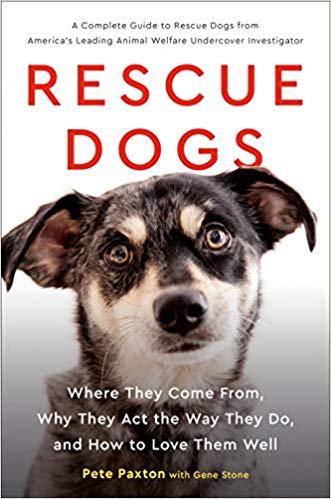Pete Paxton hesitated upon hearing the command, “Jump inside.”
Inside the trench, which was more than one hundred feet long, six feet wide, and six feet deep, lay dogs in all stages of decomposition. Paxton could see skulls, organs, guts. He saw mosquitoes and maggots. The stench was so putrid, he nearly vomited. But it was also very likely there was evidence of wrongdoing.
“Look, do you want to be an investigator or not,” Paxton was asked. “If you want to chain yourself to trees and scream at old ladies in fur coats, be my guest. But if you want to really do some good and help animals, get in that trench.”
Paxton jumped.

If you’ve ever wondered what it takes to bring down illegal dog-breeding and trafficking operations, you will find many of the answers in Pete Paxton’s new book, Rescue Dogs: Where They Come From, Why They Act the Way They Do, and How to Love Them Well. Paxton, one of America’s leading animal welfare undercover investigators, has infiltrated hundreds of puppy mills. In the process, he’s rescued and rehomed thousands of dogs.
Rescue Dog details Paxton’s undercover work exposing unscrupulous kennels, puppy mills, and commercial dealers. It is work, he says, that takes place within the “nebulous area of the law.” It involves lying, getting jobs under false pretenses, secretly filming people, gaining people’s trust, breaking that trust—and, yes, jumping into trenches filled with decaying dogs. It also involves leaving home for months at a time and taking on multiple personas. “I’ve cut, dyed, and shaved my hair several times,” Paxton writes, “grown a beard so thick my friends didn’t recognize me; switched accents when conducting investigations; developed a habit of wearing only neutral-colored clothing so I’m not easily recognized in crowds; changed my driver’s license up to three times a year; and legally changed my name three times as well.” Indeed, Pete Paxton isn’t the author’s real name. (Don’t search the book; he’s not sharing.)
According to Paxton, there are ten-thousand puppy mills in the United States producing two million puppies annually. The numbers are horrific. Just as appalling is the fact that many of these mill operators will never be brought to justice. Homicide and narcotics cases, Paxton writes, will always be prioritized over cases of animal welfare, on both the local and federal levels. When mill operators do get charged, the wheels of justice grind slowly and penalties often fail to meet the egregiousness of the crimes.
Paxton also digs into the relationship between the United States Department of Agriculture and the breeders and research labs it’s supposed to regulate. The problems, here, too, are many, from far too few inspectors to oversee licensed breeders to an Animal Welfare Act that is vague by design and rarely enforced.
Despite the challenges, Paxton’s had much success. Thus, the book is at its most riveting when Paxton shares the stories of his exploits and introduces the incredible dogs he’s met along the way.
Half-way through Rescue Dogs, the book morphs from adventure story to how-to. Want to adopt a rescue dog? Paxton advises readers how to distinguish good rescues from bad. And he provides concrete tips for training, caring for, and living with rescue dogs. Importantly, he dispels a common myth that rescue dogs are “somehow broken” or irredeemable. In fact, he explains that commercially-bred dogs, because of common practices like removing puppies from their mothers too early or breeding for physical appearance, are often the dogs most at risk for behavioral and health issues.
Want to do your part, but unsure of what you have to offer? Paxton acknowledges that many readers can’t bring more dogs into their homes, nor can they leave home for months at a time to uncover corruption. So, he offers up alternative ways for getting involved in the broader rescue community, from volunteering at shelters to supporting and promoting pro-animal legislation to refusing to buy products tested on dogs.
At its heart, Rescue Dogs is an homage to our four-legged best friends. Friends that, by law, are still considered property. Friends that, to some, are seen solely as a means to financial profit. But friends that prove time and again that their ability to overcome adversity and thrive is unparalleled. All they need from those who would take them into their homes is a whole lot of love and patience and respect and treats, a whole lot of treats.
Jacki Skole is a writer, communications professor, aspiring yogi and dog lover. Dogland: A Journey to the Heart of America’s Dog Problem is her first book.

